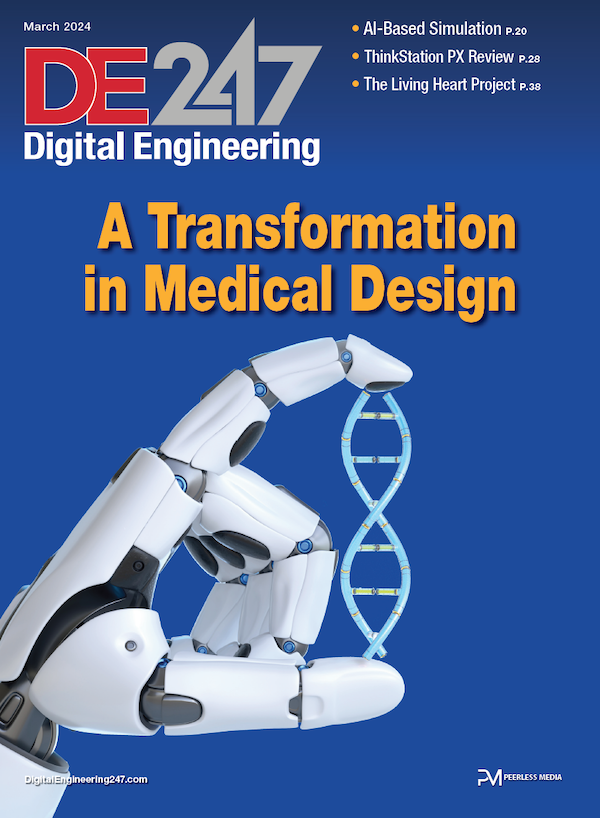Editor’s Pick: Shape Optimizer for CFD-Driven Design Updated
Company also announces a complimentary release said to help more engineers leverage simulation-driven design.
Latest News
June 5, 2013
 Here’s a really interesting application that I came across at the end of May. It’s called FRIENDSHIP-Framework, and it’s from a German developer called Friendship Systems. I knew little about this, so, I engaged in a little due diligence. I think anyone designing things with complex flow-exposed functional surfaces—say, plane wings, ship hulls, turbomachinery blades, weirdly shaped ducts, and the like—will find this tool intriguing, especially since there’s a complimentary version that you can download.
Here’s a really interesting application that I came across at the end of May. It’s called FRIENDSHIP-Framework, and it’s from a German developer called Friendship Systems. I knew little about this, so, I engaged in a little due diligence. I think anyone designing things with complex flow-exposed functional surfaces—say, plane wings, ship hulls, turbomachinery blades, weirdly shaped ducts, and the like—will find this tool intriguing, especially since there’s a complimentary version that you can download.
The thumbnail description is that FRIENDSHIP-Framework is a CFD-centric 3D parametric modeler, a portrayal that, frankly, kind of turns conventional thinking on its head. What this all means is that you can create shapes with smart parameters relevant to simulation without hassling with the features baggage that traditional CAD models come with.
You can use the software as your main CAD tool, according to the company, but it also integrates with design tools like CATIA, NX, PTC Creo, and SolidWorks. Still, the promise here is what gets me. To wit: It’s accepted as a necessary reality that CAD mavens can delay the process by making the CFD people cool their heals (sorry) waiting for an, um, de-natured model. But since FRIENDSHIP-Framework empowers CFD dudes or dudettes to build models that meet their exact needs, you can do your analyses without delay then ship off your geometric data to the CAD designer when it’s done.
FRIENDSHIP-Framework has all the usual functionality of a parametric CAD modeler, but it lets you specify the distributions of parameters—i.e., curvature, cross-sectional area, volumetric displacement, center of buoyancy, and so forth. And since these are smart parameters, you can set up FRIENDSHIP-Framework to generate design study after design study automatically.
FRIENDSHIP-Framework comes with optimization and post-processing tools. So, you can step through design variants and compare results, sort results based on defined criteria, play around to discover how certain design parameters influence behavior, and so on. It has things like Pareto frontier plots and spider-web plots, and you can create PDF or CSV design study reports automatically.
FRIENDSHIP-Framework can also couple with, launch, and control such CFD codes as ANSYS Fluent CFX, NUMECA, OpenFOAM, and STAR-CCM+. It even works with in-house codes that can run in batch mode from a geometry file and input script. There’s even an optional web interface for configuring your resources to run on a network or cluster.
OK, I’m trying to cram too much into too tight a space. The point is that FRIENDSHIP-Framework sounds cool and potentially very able to eliminate annoying steps and make processes more efficient. And that’s where the download comes in.
The download is called CAESES (CAE software for empowering simulation). It’s based on the same technology used in FRIENDSHIP-Framework. It provides parametric CAD functionality, some automation features, as well as variant management and post-processing CFD design comparisons. CAESES, like FRIENDSHIP-Framework, runs on 32-/64-bit Linux and Windows platforms. A link to download CAESES and links to lots more information about the FRIENDSHIP-Framework can be found at the end of today’s Pick of the Week write-up. Try it out and see what simulation-driven design can mean for you.
Thanks, Pal. — Lockwood
Anthony J. Lockwood
Editor at Large, Desktop Engineering
Read today’s pick of the week write-up.
This is sponsored content. Click here to see how it works.
Subscribe to our FREE magazine, FREE email newsletters or both!
Latest News
About the Author
Anthony J. Lockwood is Digital Engineering’s founding editor. He is now retired. Contact him via [email protected].
Follow DE





